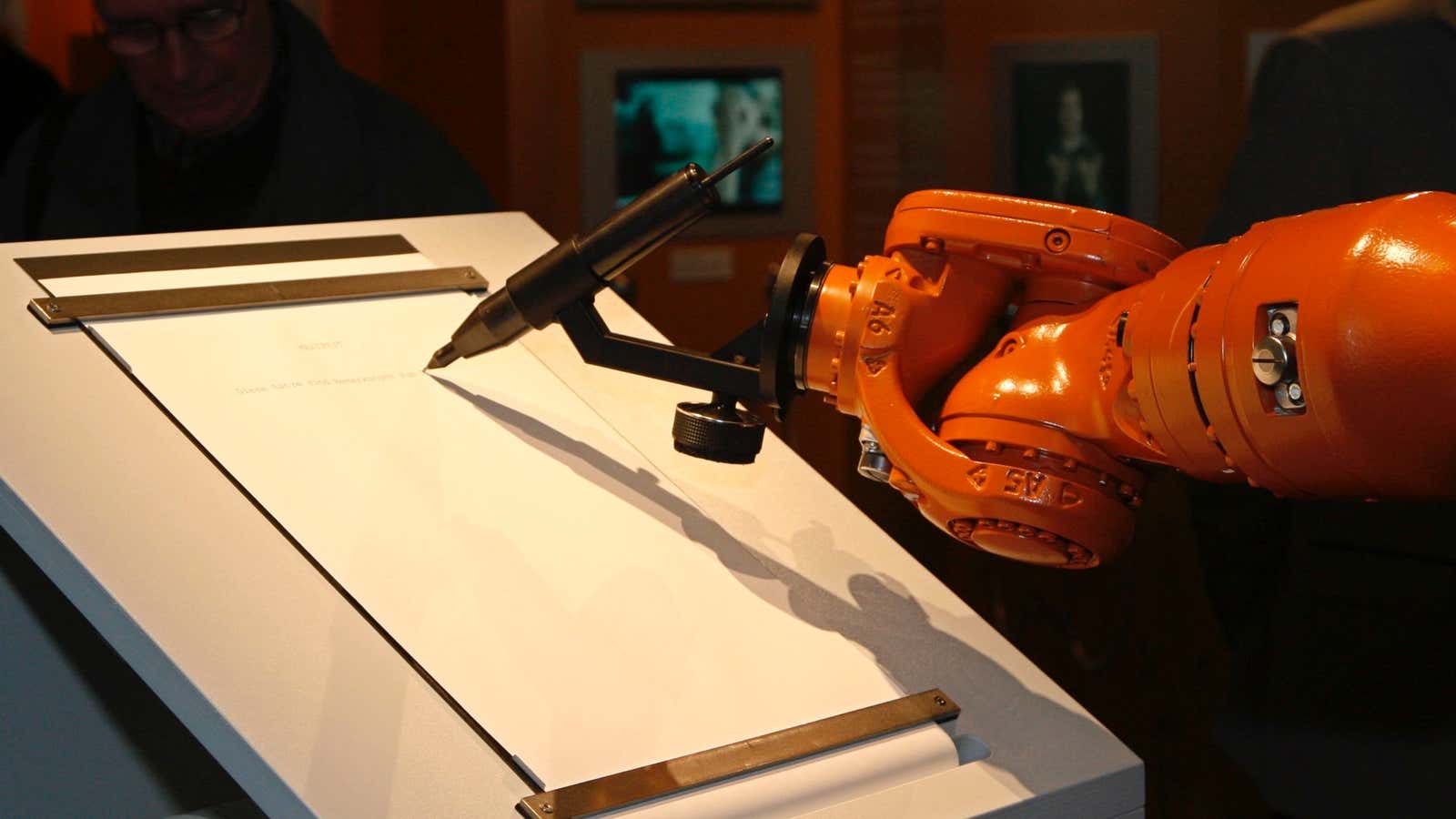There are robot reporters and robot chefs, but for the most part, the creative world has been free from the rise of the robots. One definition of art is ”something that is created with imagination and skill and that is beautiful or that expresses important ideas or feelings.” Can something that does not feel create art?
Dartmouth College wants to find out.
The Ivy League institution is hosting three competitions to see whether engineers can build programs that can create works of art—a short story, a sonnet, and a DJ set—that humans would believe were created by other humans. Daniel Rockmore, a mathematics and computer science professor at Dartmouth, is leading the competition, along with Michael Casey, a music professor, and two post-doc students, Allen Riddell and Kirstyn Leuner.
For the sonnet and short story contests, a computer will be given 24 hours to produce work that could theoretically appear in the New Yorker or an MFA literary collection, which is probably a lot less time than the average writer takes to produce something that rises to that level. Judges will then be given a collection of work that includes the computer-generated works and controls from aspiring human writers—rather than famous authors—so that judges don’t recognize any of the human pieces.
For the DJ set, a computer must be able to make 15-minute set of music based on a list of 1,000 songs shown to it two hours before it’s ready to DJ. Human DJs will be given the same list and timeframe, and will be asked to make their own set. Rockmore and his team will then assemble an audience of willing dancers to party to both the computer and human setlists. The dancers will then be asked which sets they think were generated by machines.
The deadline for teams to submit their entries to the competitions is April 2016. If any entrant manages to convince a panel of judges that its work of art was created by a human, it will win $5,000. Rockmore told Quartz he would “be pretty surprised” if anyone ‘won’ the short story or sonnet competitions, but will be handing out a $3,000 prize (as well as two $1,000 runner-up prizes) for any submissions show signs of improvement in how a computer handles the idea of creation (though don’t fool anyone). “Even if we fail, even the way we fail could be interesting,” Rockmore said.
“Outside of the movie Her, I don’t know if there’s a business model for making short stories or sonnets,” he added, but hopes the competitions will ”generate some new understanding about cognition in the arts.” Even in Her, with all the things computers could do, however, Joaquin Phoenix’s character still had a job penning love letters supposedly from one human to another.
There is a robot on the market that its makers claim can generate its own emotions—perhaps it should enter this competition—but as the film Ex Machina pointed out, there’s a difference between mimicking the emotions humans are likely to feel in a given situation, and actually feeling those emotions.
So does a robot actually need to feel to make art? Probably not, Rockmore told Quartz. ”Any piece of great art is quite simply a piece of great art.” Rockmore said. “If you can find new ways to create them, that’s great.”
Rockmore said that passing the famous Turing test of machine intelligence depends somewhat on the time the test is taken, as our perceptions of language are fluid. Today we might be fine with a computer using abbreviations or slang in discourse, but that wouldn’t have been acceptable in decades past. “Whatever comes out of this as a sonnet or a short story, we may accept it, but would somebody have accepted it 20 years ago?” Rockmore said. “It’s sort of a moving target.”
When asked how a computer could create a love poem if it has not loved, Rockmore said that there’s more than one way to create art. If a computer program can analyze every sonnet ever written and synthesize a new sonnet out of that content by following the rules, has it not created a sonnet? “The sonnet test is one I view as potentially easier: There more structure a priori in a sonnet.” Rockmore said. “A sonnet has a narrative as well as the right rhyme scheme and rhythm.”
But will these competitions pave the way for actual artificial intelligence? Rockmore doesn’t share the fears of a robot future of Elon Musk or Stephen Hawking. He’s more optimistic. ”More and more people will begin to attend to the idea that machine will be generating things that we find comfort in, that bring us the kind of joy that we look for in great art, or even companionship.”
Still, Rockmore applies the famous Woody Allen quote to the future of artificial intelligence: “How do you make God laugh? Tell her your plans.”
